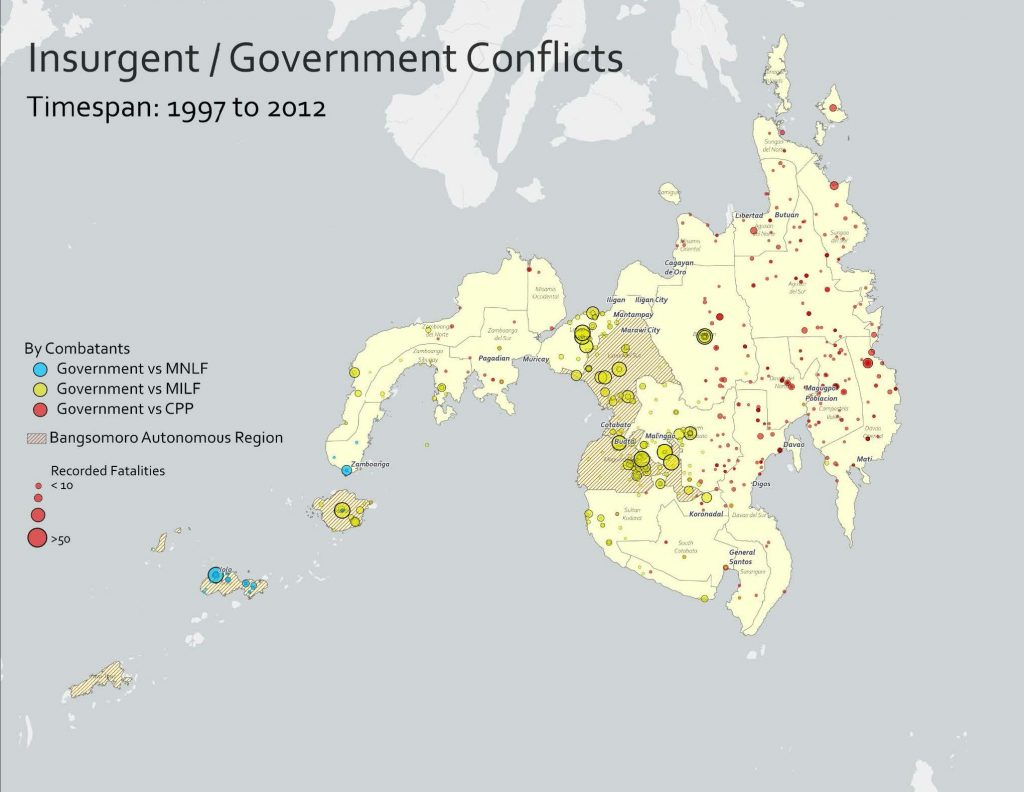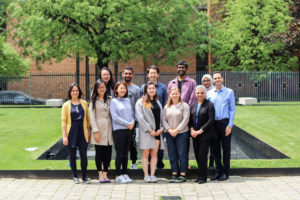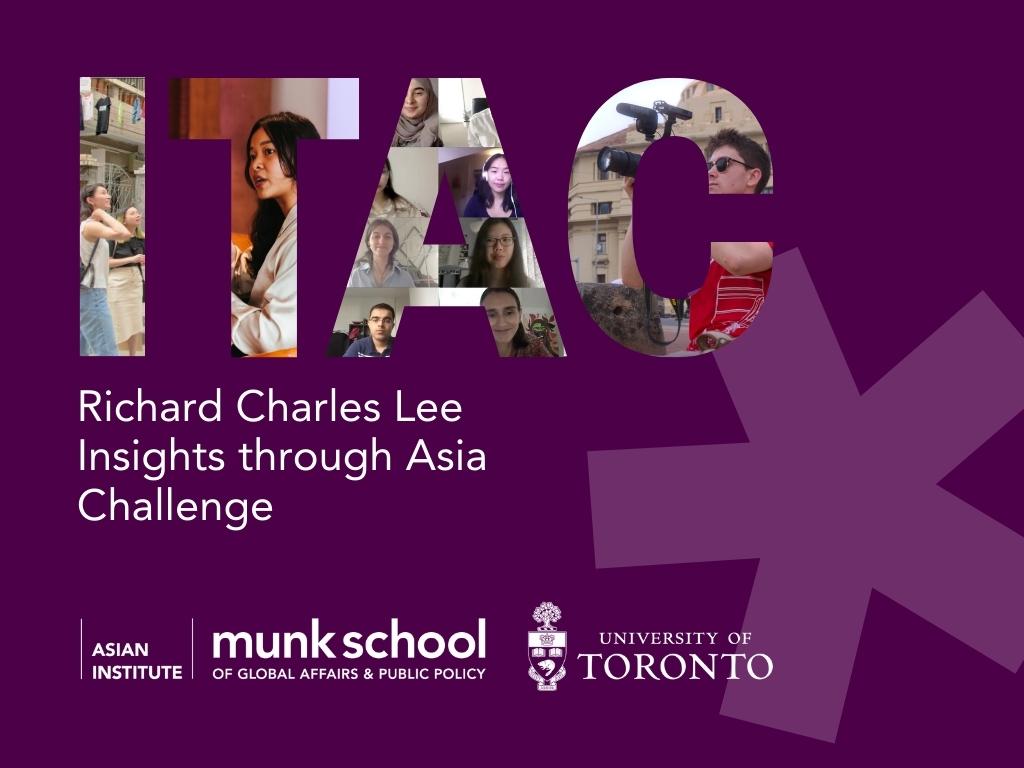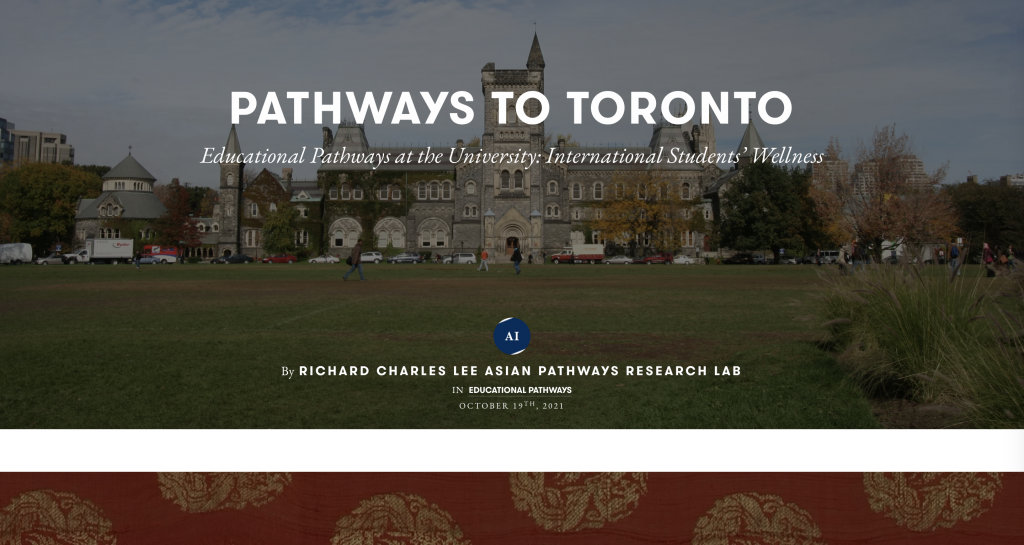Current Projects
Richard Charles Lee Insights through Asia Challenge (ITAC)
The Asian Institute’s Richard Charles Lee Insights through Asia Challenge (ITAC) is an award-winning program that supports outstanding student experiential research.
Working together in small, focused teams, awarded students are FUNDED to conduct research on a professor-led project over the summer semester, gaining direct research experience on a major scholarly project with an expert in the field.
In addition to a unique research experience, awardees form a dynamic peer group. Students will receive academic and professional development training specific to their faculty-led project. They will also be supported in developing all the tools necessary for a successful ITAC experience—from submitting an initial application to presenting research outcomes and beyond.
ITAC culminates with a public showcase of research outcomes in September 2022.
Previous Projects
Digital Pedagogy, Asian Pathways: Interrogating Geospatial Approaches to Conflict in the Philippines
Led by the Asian Institute’s Richard Charles Lee Postdoctoral Fellow, Dr. Joseph McQuade, the 2020-2021 RCL Asian Pathways Research Lab trained a team of Research Interns to use digitized archival sources and geospatial tools to research, track, and visualize data related to conflict and environmental insecurity on Mindanao, the second largest island in the Philippines. Through a series of collective workshops and individual assignments, Research Interns used digitized sources to better understand the spatial dimensions of conflict and environmental vulnerability in the region, as well as the colonial genealogies and ethical implications of cartographic digital research. In collaboration with GIS (Geographic Information Systems) specialists from the Appraising Risk Project at McGill University’s Indian Ocean World Centre, interns contributed to a collective data set and received technical training in how to visualize and analyze this data in a free and open-source GIS platform. We hope that our maps and analysis will contribute to wider conversations within the digital humanities regarding the ways that data visualizations can help researchers think into their projects from new perspectives.

Figure 1: Conflict in the Philippines, 1986-2020 (map produced by the Appraising Risk
partnership).

Figure 3: Conflict incidents on Mindanao, 1997 to 2012 (map produced by the
Appraising Risk partnership).
Educational Pathways at the University: International Students’ Wellness
We are delighted to share the results of the 2019-2020 Richard Charles Lee Asian Pathways Research Lab project, viewable as a multi-media web project here. This project, Educational Pathways at the University: International Students’ Wellness, investigates the experiences of international students from mainland China and Taiwan at U of T, exploring the intersection of international students’ mobilities, education and wellness.
The themes at the centre of the project—pathways to wellness among international students—have only continued to grow in significance. As with other RCL-APRL projects, student researchers received training in qualitative research methods. They designed, led, transcribed, and coded semi-structured interviews, and then wrote up brief articles synthesizing their findings. They learned from their fellow students’ stories, finding both recognition for their own struggles as well as inspiration for developing new pathways to wellness. Perhaps most importantly, the ties they forged with one another deepened through the research process, offering sustenance that extends well past the project’s completion.
These stories reveal some of the hardest truths of the experience of being an international student. The student researchers have not shied away from analyzing the most difficult issues, but they also reveal the tremendous diversity of experiences. This project offered the opportunity and the methods to delve into thinking about both the unique challenges and the numerous successes that international students from mainland China and Taiwan face. The researchers not only developed analytical insight into the shared nature of their interviewees’ itineraries, but also the RCL-APRL has enabled them to develop new tools for offering support and celebrating their interviewees’ accomplishments. We are particularly gratified to report that the results of this project’s findings are feeding into policy recommendations aimed at continuing to improve international student life at the University of Toronto, one of the most exciting and immediate outcomes of the RCL-APRL to date.
 The Grandparent Project: Inter-generational Conversations about Family, Mobility and Identity
The Grandparent Project: Inter-generational Conversations about Family, Mobility and Identity
Conducted in 2017-2018 and 2018-2019, this project collected oral mobility histories from, between and within Asia and Canada. Students who worked on this project were encouraged to investigate mobility histories and practices within their own families as well as to reflect on how their own pathways are both similar and different from those of older generations. The project promoted self-reflection on the part of the student researcher and a context for new kinds of inter-generational conversations about the changing meanings of home, belonging, mobility, identity, diaspora, and citizenship for each generation in distinct contexts. By allowing family members to share their own life experiences and pathways, a clearer picture of the entangled trajectories of multiple generations emerged and formed the basis of analysis for student papers and projects. The final projects were published in the RCL-APRL magazine, Pathways.
Pathways Magazine
Pathways magazine was produced through the Grandparent Project, a core initiative of the 2017-2018 Richard Charles Lee Asian Pathways Research Lab (RCL-APRL) at the Asian Institute, University of Toronto. Teams of students joined this collaborative project to research and share stories about the older generations in their families.
Pathways , Volume 1
Pathways Volume 1 is dedicated to the collection of oral histories of mobility from, between, and within Asia and Canada. Student researchers investigate mobility histories and practices within their own families and reflect on how their own pathways echo and differ from those of older generations.
View and download a copy of Pathways Vol. 1 here.
Pathways , Volume 2
Pathways Volume 2 delves into the stories of twelve pairs of Chinese-Canadian mothers and daughters, exploring their relationships, their mobilities, and their processes of negotiating specifically gendered Chinese-Canadian identities across generations and geographies.
View and download a copy of Pathways Vol. 2 here.
The Politics and Poetics of Urban Mobilities and Spatialities: Comparative Cases Across Minority Communities in the GTA
The main objective of this project is to explore the micro politics of urban mobilities and spatialities within a range of minority ethnic, religious, national, and sexual communities, particularly Asian-Canadian in the GTA. This project foregrounds specifically situated perspectives that takes into consideration axes of difference as intersecting core factors influencing the ways that groups of people can be in, use, move through, and make claims to public space, and by extension, claims to membership in local, national, and transnational publics. Students working on this project, engage with community members to chart their urban mobilities and spatialities as they simultaneously explore group subjectivities, in order to understand some of the unique ways that diverse communities use/appropriate public space to stake claims to and negotiate their status as citizens. The students also investigate trends, relationships, power dynamics, and tensions between the local, national and transnational publics that these individuals and communities are embedded within seeking to understand how these take shape and inform their everyday mobilities and spatialities in the city.

